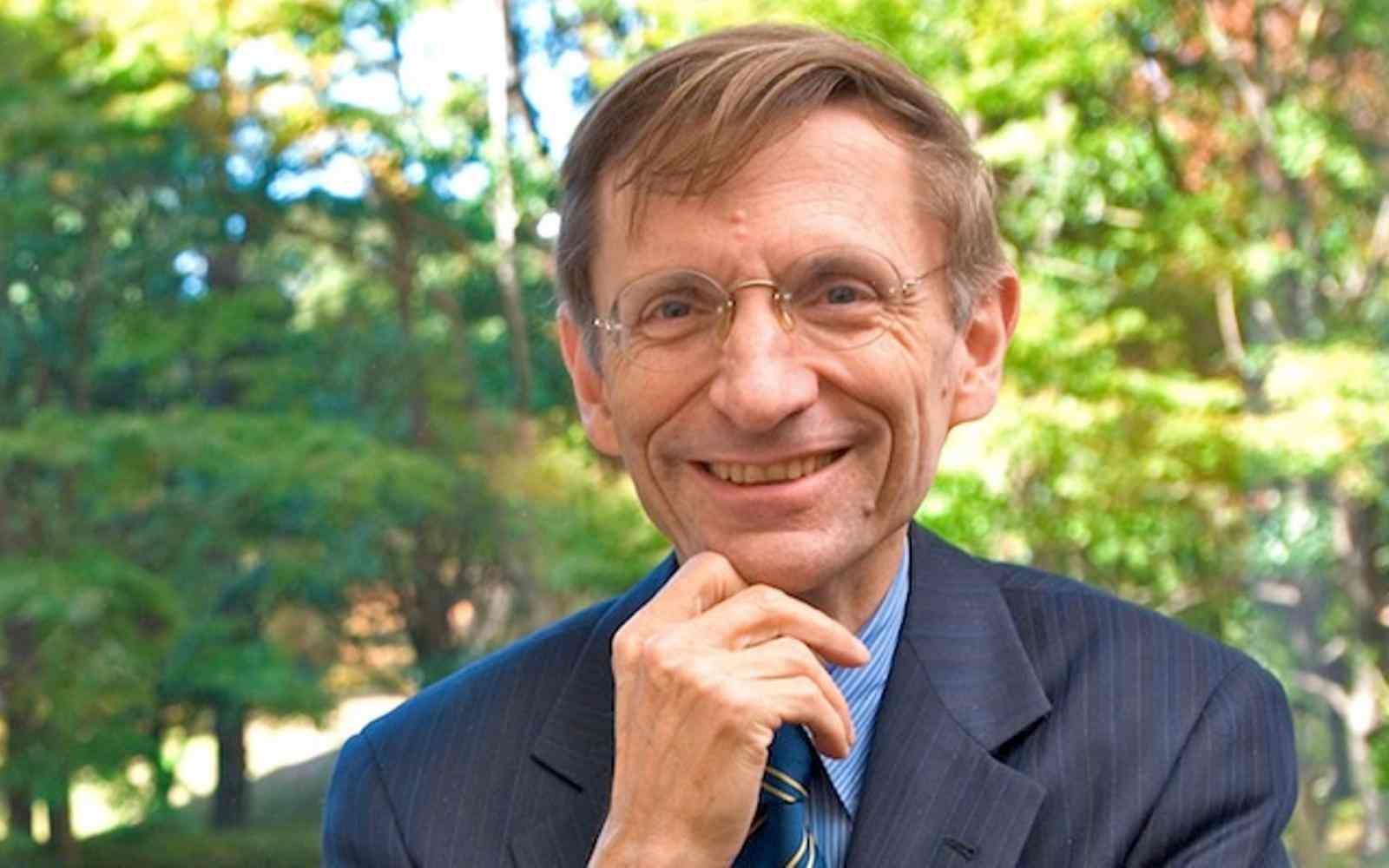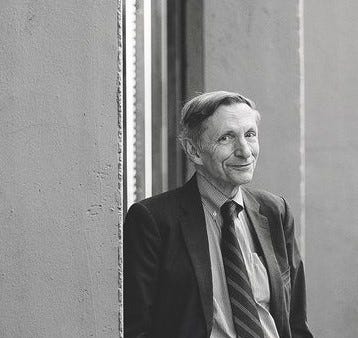How to Save the World
Ruminating with Bill Drayton about social entrepreneurship and his goal of making "everyone a changemaker."
I first met Bill Drayton more than a decade ago and consider myself blessed that about twice a year I get to spent a couple hours just talking to him. He is often described as a genius and while I don’t quite know what that means, I’m sure he qualifies. Now 79, Bill has been a social entrepreneur — the phrase he popularized — his whole life. He started a newspaper in elementary school and in high school at Phillips Academy (which I later attended) he started the Asia Society (which became the largest student organization) and — with encouragement from Hubert Humphrey and Bayard Rustin — took part in the civil rights movement.
After Harvard, Oxford and Yale Law, he became a star management consultant at McKinsey & Company, where he designed many innovations ranging from multiple supports for black capitalism to tax incentives that triggered a major switch to lower tar and nicotine cigarettes. He later helped originate and then champion emissions trading — the key use of the market to reduce pollution. He brought these and other path-breaking ideas into the Carter Administration, where he served as assistant administrator of the EPA and helped write and implement several pieces of historic environmental legislation. By 1990, the cap-and-trade system he pioneered had created huge new incentives for environmental innovation and sharply reduced many pollutants -- in politically acceptable ways. Even though it suffered a narrow defeat in Congress in 2010, it is central to environmental management from California to Europe to China.
Bill also champions replacing payroll taxes (lowering the cost of hiring) with taxes on things (encouraging conservation and hiring). Most European countries are moving in this direction, and Al Gore, Bill Bradley, and both parties (at different times) have agreed. This change in pricing is worth roughly 45 million full-time-equivalent new jobs in the U.S. (See www.getamericaworking.org.)
In 1980, Bill founded Ashoka (named for an extraordinarily creative and tolerant Indian emperor in the 3rd Century B.C.E.), which identifies and assists more than 4,000 leading social entrepreneurs at work in more than 100 countries, building broad movements and innovating for the public. These Ashoka Fellows run the most cutting-edge citizen sector organizations (Drayton doesn’t call them “non-profits”) in the world. The citizen sector has experienced explosive growth over the last 40 years. Three-quarters of the social entrepreneurs certified by Ashoka have made meaningful, measurable change in their societies. Three-quarters have changed the patterns in their fields at the national and/or international level within ten years of launch.
Bill’s big idea nowadays is that, to survive in the 21st Century, everyone needs to learn how to make change in their own lives, in their communities and in the wider world. “Everyone a changemaker” isn’t quite as well-known as “social entrepreneur,” but it’s getting there. I wanted to talk to him about it.
JONATHAN ALTER:
There are obviously many reasons Trump got 70 million votes in the last election — the power of Fox News and other rightwing information silos, racism, the effectiveness of demagoguery. But the authentic frustrations of working-class Americans over feeling they’ve been left behind is clearly a big part of it.
You’ve got an overarching global explanation for this that’s important to grasp.
BILL DRAYTON:
We all know everything is changing faster and faster, and the world is more and more interconnected. To have a life now, people must have the ability to play in this new game. If they can’t adapt to change, they’re out. They're crushed. That’s because the demand for repetition work is going away really, really fast.
For hundreds if not thousands of years, people around the world learned skills — often from their fathers — and then spent their lives doing the same thing over and over and over again — whether as farmers or artisans or assembly-line workers or, more recently, as accountants filling out tax returns and lawyers writing wills. The economy of every country in the world was based on this specialization and repetition.
The end of all that — the replacement of repetition work with software or robots or off-shoring or other disruptions in your livelihood -- is the social and economic story of our time. The reason Trump could walk down Fifth Avenue and shoot someone and not upset his base is that he is serving a psychological need for those individuals. If you're being crushed by this, “the new inequality,” you feel your life is a failure even if you still have some kind of job and don’t show up in unemployment statistics. You think your kids don't have a future. You realize other people around you are similarly situated and there’s no real way out.
“…the replacement of repetition work with software or robots or off-shoring or other disruptions in your livelihood -- is the social and economic story of our time. The reason Trump could walk down Fifth Avenue and shoot someone and not upset his base is that he is serving a psychological need for those individuals.”
JON:
Certainly not some program to re-train you when you’re 55.
BILL DRAYTON:
The work of the Ashoka Fellows makes clear that everyone wants, indeed needs, to be a giver and that everyone can learn how to do so in the new game. Over a thousand Fellows working with kids put them in charge (in a million schools) -- and it works. Others achieve the same result with older people and others.
But they must learn almost opposite abilities to those valued in the world of repetition. They urgently want to do so, and they can learn. Our ethical obligation is to ensure they all do learn to be givers, which now requires them to be changemakers.
Low changemaking counties in America have, in one generation, lost four years of life expectancy.
The despair of a failed life is harsh. One response is self-blame and slow suicide. The other is the urgent need to blame others. The demagogues oblige. They provide easy targets -- in the U.S., immigrants, Muslims, and African Americans. It didn't start with Trump and doesn't end with him. And it's not limited to the U.S. It’s happening all over the world — to Muslims in Europe and India, and other minority groups elsewhere. Even where authoritarian governments haven’t — yet — taken power, this basic dynamic is underway and is clearly connected to the disappearance of repetition work and the consequences of that even for white-collar workers.
JON:
This is where adaptability, agility, agency, initiative — being a changemaker — comes in. How did the idea of “everyone a changemaker” start?
BILL DRAYTON:
It came out of social entrepreneurship, which got a big boost from David Bornstein’s book, How to Change the World and now his and others’ work in solutions journalism, which is helping thousands of news organizations around the world give people the information they need to bring about meaningful change. It helped a lot when Forbes magazine and columnists like David Brooks and Nicholas Kristof embraced social entrepreneurship and “everyone a changemaker”.
JON:
What does a child need to become a changemaker?
BILL DRAYTON:
If you want your daughter or nephew to have a life in today’s everything-changing new reality, you must:
1. Ensure that she masters and practices “conscious empathy-based living for the good of all”. She belongs to the first generation where one can’t be a good person by diligently following the rules. Increasingly they are not there. She must consciously understand the people and contexts around her and choose skillfully for the good. Otherwise, she’ll be thrown out of the game when she (unintentionally) hurts someone or disrupts a group.
2. Ensure that in her early teens she has the life-changing experience of “your dream, your team, your changed world”. It could be a virtual radio station, ensuring special kids are treated well, etc. Once she has done this, she’ll know deep down that she is a changemaker and has a great future.
The evidence of where this leads is overpowering. Using data from LinkedIn, we’ve found, for example, that young people who became changemakers in their teens [leading a cleanup, starting a school club, launching a business] do dramatically better in the world than others. It’s a better predictor of success than grades or the status of your college. They’re four times as likely to be a C-suite person [senior corporate executive] and they’re five times as likely to be a founder. And if you’re a changemaker, you don’t have to leave your community to build a better life. You can stay home or return there and make things happen.
Not everyone will be a great entrepreneur bringing society-wide pattern change. But everyone must be equipped with the changemaking skills that will help them not just respond to rapid change but initiate change in their own and their families’ conditions. So…do help your kids have a dream, build a team, and change their world. There’s nothing more important.
JON:
How do you spread this idea?
BILL DRAYTON:
Working together, our community has learned how to help mega organizations see their best strategy by far is to help those they serve make this transition. Having, for example, the top ed schools, teachers unions, and publishers as all-in allies is critical to redefining what constitutes success in growing up. The combination of these “jujitsu partners”, the Ashoka Fellows, and the Ashoka Young Changemakers is dynamite.
This approach is succeeding in Latin America, Africa, and Southeast Asia now and is spreading fast.
JON:
I get that social media can turbocharge changemaking. But you also think that being a changemaker in a business or government agency or NGO isn’t enough, right? You need to create what you call “teams of teams” to respond flexibly and nimbly to change and move out of the specialization silos that are becoming increasingly obsolete. I like your idea of creating makeshift teams made up of people passionately interested in addressing a problem, even if it’s outside of their area of expertise. When that team asks for volunteers within the organization to work the problem, you get a very positive selection process with a bias for commitment and action.
BILL DRAYTON:
You’re right: Anyone who gives themselves permission to see a need, imagine a better way, and invite a team can quickly build the team of teams needed to change that dimension of the world. And all these quickly generating and evolving teams of teams cross-multiply one another’s power.
This is a far, far better world. We can take on every need. And each person is helping everyone on their teams be the best possible player, i.e. giver, i.e., changemaker.
JON:
I look forward to watching you scale that, the way you have with social entrepreneurship. Thanks, Bill.







Thanks, Jon, for introducing me to Bill Drayton and these forward looking ideas.
Dr. King taught us that "Everyone can be great, because everyone can serve." It crushed the idea that service and change-making was restricted to the elite (enforced by early expectations of their schools, faith communities, and families) and not for the masses. After all, service and change-making is power. And nobody readily shares power. Like Harris Wofford, Bill Drayton believes in "the everyone" factor, and that will save us, if we dare to embrace it in-school and after-school.